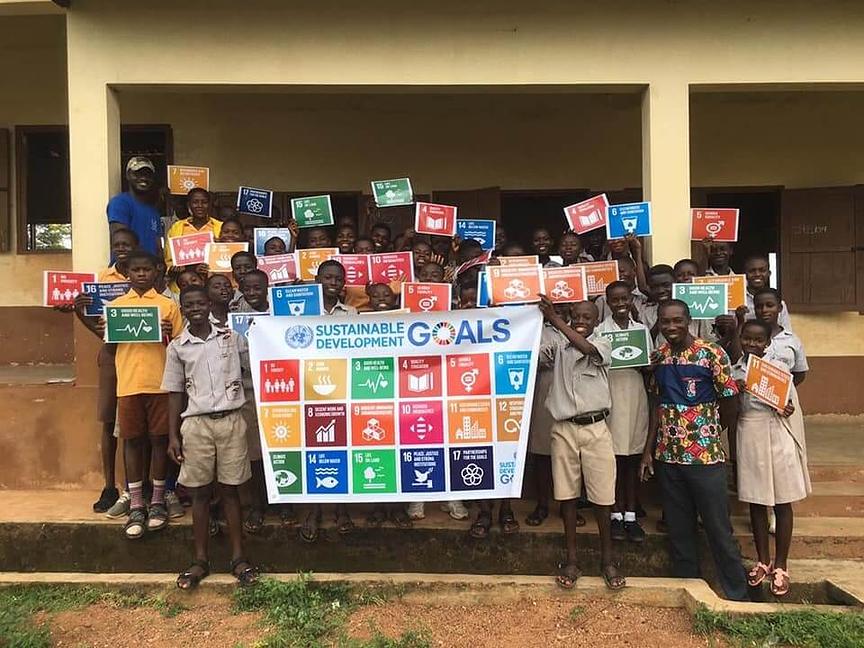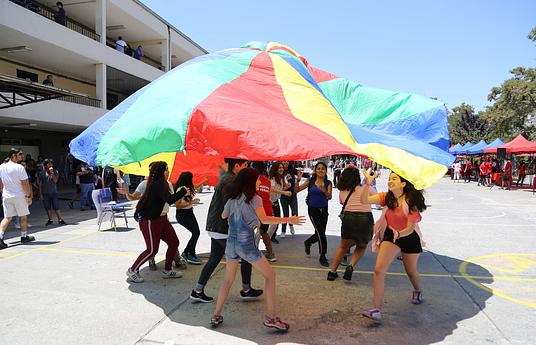The Global Schools Program works across 100+ countries to transform learning and give students the knowledge, values, and skills to take action for the SDGs as informed global citizens. Global Schools started from the powerful realization that many teachers wanted to change the world, but most didn’t know how.
Today, there are 1.2 billion young people in the world, accounting for 16% of the global population, and this is projected to increase by 7% by 2030. Therefore, education is a key driver to achieve sustainable development. However, Education for Sustainable Development (ESD) is largely absent from primary and secondary education globally.
A UNESCO survey of 58,000 educators found that teachers are interested in teaching ESD; however, 6 out of 10 teachers say they are not confident in teaching the environmental aspects of sustainable development.
Therefore, since its inception, Global Schools has provided pre-primary, primary, and secondary schools with free resources, tools, and training to teach sustainability in the classroom; improve student skills; introduce the use of new pedagogical approaches such as active-learning teaching methods; and engage students in 15,000 action projects and activities. Overall, 98% of participating school leaders and teachers would recommend Global Schools training programs to colleagues.
The Global Schools Program (GSP) works through a network of 2,000+ pre-primary, primary, and secondary schools in 100 countries. Global Schools' flagship initiative is the Global Schools Advocates Program, a training program for teachers to improve ESD delivery and increase sustainability literacy in classrooms, developed after surveying 220 local ESD champions and 40 educators.
1. PHASE 1: Training - Educators complete an online training course, which spans both cognitive knowledge and pedagogy. The training includes 30+ lectures, original readings, and comprehensive assessments. 17 supporting documents assist teachers in ESD implementation via a specific action-research methodology.
2. PHASE 2: Introducing ESD to the school - Teachers are given presentations, multimedia resources, and outreach text to support the integration of ESD within the school community.
3. PHASE 3: Integrating ESD - Teachers work with lesson plans, activities, and curricular content, integrating it into their school based on their curricular audits in phase 2. Teachers are given an M&E guidebook.
4. PHASE 4: Reflection and Sharing - Teachers turn in final surveys and testimonials, and work with their mentors to reflect on the program, what went well, and what sustainable changes have been made in their school. 96% of participating educators agreed or strongly agreed that they “incorporate ESD competencies in lessons” after the program, compared to 62% before.
The Global Schools Program has been spreading in a multitude of ways across the globe:
• ESD Training – Via the Global Schools Advocates Program, Global Schools has trained ~1,800 teachers across 80 countries. These teachers have collectively engaged ~310,000 students, ~53,000 colleagues/staff and ~100,000 parents and community members in their students’ local activities and action projects. In addition, Global Schools established a training of trainer’s model. Experienced trainers within the Global Schools ecosystem have trained an additional 35,000 individuals on ESD.
• Community of practice – Furthermore, working with SDSN Networks and partners within countries, Global Schools has expanded its network to 1,829 schools, 1,646,912 students, and 136,840 educators.
• Content – We have released lesson plans in 14 languages and provided more relevant content for schools including project-based learning and systems thinking activities guides; teacher handbooks; curriculum guidance, and more. This content is developed in partnership with teachers and leading education and sustainability experts.
• Partnerships & Thought Leadership – Via partnerships with organizations and thought leadership at conferences such as the UN Transforming Education Summit, COP, and more, we have spread the mission and vision of the Global Schools Program.
We consistently carry out comprehensive surveys and focus groups to assess the quality of our training. Data and testimonials from Global Schools-trained teachers reveals the program’s long-term, positive impact extends to school-wide practices. On average, teachers self-report that students showed increased abilities to: apply critical thinking to understand global issues; reflect on their role in their local community; implement solutions for sustainable development.
Even so, we have worked hard to expand our offerings to provide more contextualized, localized, and relevant opportunities for schools. These include:
• New training for teachers and students via our Schools for Goal 7 program on renewable energy, climate change, and sustainable development through gamified curricula via the Planet Rescuers Minecraft Education game.
• Launch of the UN at Your Doorstep initiative that connects today’s global leaders with tomorrow’s changemakers via virtual exchanges, having students lead global dialogues and progress through an engaging curriculum incorporating systems thinking pedagogy and GIS tools. Since the launch in October 2024, 11,000+ learners from 160+ countries have joined the program.
• New monthly professional development training; opportunities for schools to present their work at high-level conferences; and case-study books of institutions successfully integrating sustainability into their operations and practices.
Schools and teachers can view the resources and lesson plans on the Global School website, as well as sign up for our specific programs and initiatives. They can also join the Global Schools network.
Ministries, school leaders, government, partners, and prospective donors are also welcome to reach out to the Global Schools team: globalschools@unsdsn.org



